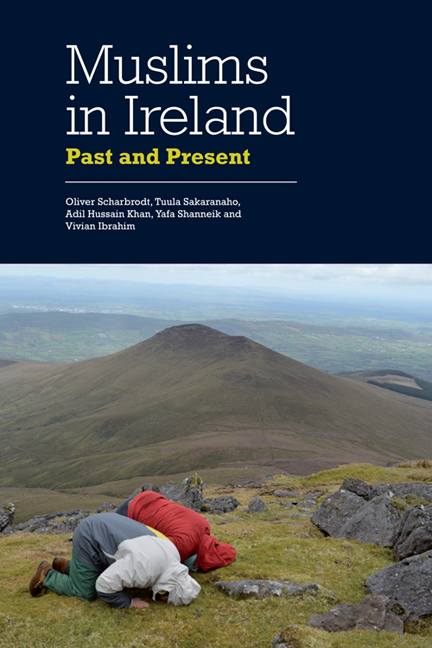Book contents
- Frontmatter
- Contents
- Figures
- Acknowledgements
- Introduction
- I History of Muslim Presence and Immigration to Ireland
- 1 Sailors, Merchants, Migrants: From the Sack of Baltimore to World War II
- 2 Muslim Immigration to Ireland after World War II
- II Mosques, Organisations and Leadership
- III The Governance of Islam in the Republic of Ireland: Freedom of Religion and Islamic Education
- IV Diaspora and Identity
- Conclusion: Being Irish, Being Muslim
- Bibliography
- Index
1 - Sailors, Merchants, Migrants: From the Sack of Baltimore to World War II
from I - History of Muslim Presence and Immigration to Ireland
Published online by Cambridge University Press: 05 August 2016
- Frontmatter
- Contents
- Figures
- Acknowledgements
- Introduction
- I History of Muslim Presence and Immigration to Ireland
- 1 Sailors, Merchants, Migrants: From the Sack of Baltimore to World War II
- 2 Muslim Immigration to Ireland after World War II
- II Mosques, Organisations and Leadership
- III The Governance of Islam in the Republic of Ireland: Freedom of Religion and Islamic Education
- IV Diaspora and Identity
- Conclusion: Being Irish, Being Muslim
- Bibliography
- Index
Summary
Introduction
The majority of current studies that examine Islam in a Western context are largely grounded in contemporary debates and broadly sketch the boundaries of Europe's most prominent policy concerns. Focusing on questions of identity formation, integration and political Islam, the propensity of this literature is based on three main assumptions. First, that there is a fixed and common understanding of an inherent and unspecified ‘threat’ that is posed by political Islam. Second, that identity formation is largely shaped by religious affiliations; this had led to the ‘desire to study Islam as a newly arriving religion, belonging to ethnic groups new to [Western Europe] and thus as forming an important part of the traditions of the immigrants’ country of origin’. Third, that the integration of Muslims, and in particular ‘Muslim communities’, must be established if Europe and Islam are to be compatible. The main question that preoccupies these studies is whether it is possible for Muslims to assert their own cultural and religious practice while simultaneously participating in Western societies. This chapter will argue, however, that while these are important conversations, they are largely flawed in many of their assumptions and largely inapplicable to the historical study of Muslims in the West, and more specifically in their application to Ireland.
Through an examination of the seventeenth to the early twentieth century, questions will be asked, including: what does it mean to define or inflict Islam as a religious affiliation?; and, how does regional identity affect one's religious identity when clearly both region and locality play a definitive role in moulding one's particular cultural experience of a religious tradition? This chapter seeks to avoid projecting an essentialised conception of religion and its practice. In contrast to much of the existing literature, which focuses on Islam as a belief system and not on the individual religiosities of people, this chapter will examine individuals beyond the boundaries of a system or organisation. The impact of this methodological approach is to encompass the complexities and nuances of a ‘Muslim’ crossing societal, cultural, political and regional formations. In doing so, variations in practices and affinities over time can be accounted for. At the centre of this approach is the question of what role historical context plays in identity formations.
- Type
- Chapter
- Information
- Muslims in IrelandPast and Present, pp. 27 - 48Publisher: Edinburgh University PressPrint publication year: 2015



